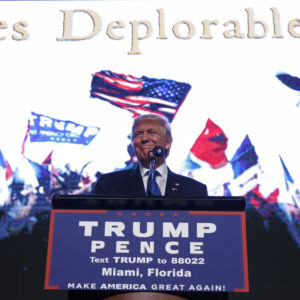The United Auto Workers (UAW) reaffirmed its opposition to outsourcing Tuesday in response to president-elect Donald Trump’s efforts to save autoworker jobs.
Trump threatened to impose higher taxes Tuesday on General Motors (GM) for making some Chevrolet Cruzes in Mexico. Ford Motor Company, a rival automaker, announced just hours later it had canceled its own outsourcing plans. UAW President Dennis Williams noted the announcement was welcome news.
“The UAW has long believed that companies that sell in our country should build their products in our country,” Williams said in a statement. “We are proud of the quality of work in Lordstown with the Cruze sedan and we welcome Ford’s Flat Rock announcement today.”
Ford plans to invest $700 million at its Flat Rock Assembly Plant in Michigan.
General Motors responded to Trump’s threat by noting most Cruzes sold domestically are built in the country. The automaker didn’t say whether it otherwise plans to change business operations.
“General Motors manufactures the Chevrolet Cruze sedan in Lordstown, Ohio,” GM said in a statement. “All Chevrolet Cruze sedans sold in the U.S. are built in GM’s assembly plant in Lordstown, Ohio. GM builds the Chevrolet Cruze hatchback for global markets in Mexico, with a small number sold in the U.S.”
Trump has promised to implement pro-business policies when he becomes president. Ford President Mark Fields said the decision to not outsource jobs was based primarily on the hope the president-elect will uphold his pledge to the business community.
“This makes sense for our business, and we look at all factors, including what we view as a more positive U.S. business manufacturing environment under President-elect Trump,” Fields told CNN. “It’s literally a vote of confidence around some of the pro-growth policies that he has been outlining.”
Trump and labor unions have had a contentious relationship throughout the election and transition period. Unions have blasted the president-elect for his stance on a range of workplace issues and for his cabinet picks. But international trade and protecting American jobs have been points of agreement.
Trump has relentlessly attacked poorly-negotiated trade deals and lax border enforcement because of their impact on the working class. He has also threatened to raise taxes on companies that outsource jobs. Critics have argued restricting international commerce will do more harm than good.
Trump has said trade deals must be renegotiated so domestic workers aren’t hurt. The North American Free Trade Agreement (NAFTA) and the now derailed Trans-Pacific Partnership (TPP) were often cited by the president-elect as harmful to American workers.
International trade in recent years has become a heated issue that has created some unlikely allies. Democratic President Barack Obama and congressional Republicans both worked to get TPP passed. Trump, left-leaning Democrats, and unions, however, have been adamantly opposed to the trade deal.
Trump will have the chance to prove whether he can fight outsourcing when he is sworn in Jan. 20. He has already been talking to business leaders and made moves to save jobs at individual companies.

